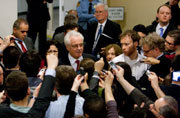 On Friday the UN Security Council will consider a draft resolution on Syria based on the Arab League’s peace plan, which was modeled on the Gulf Cooperation Council (GCC) initiative on Yemen that successfully led to President Ali Abdullah Saleh stepping down. The conflict in Syria began amid the regional upheaval that swept through the Middle East and North Africa in 2011 and shows little sign of letting up. The government of Bashar al-Assad continues to deflect calls to halt the violent crackdown on protestors, which has so far claimed more than 5,000 lives, according to UN reports.
On Friday the UN Security Council will consider a draft resolution on Syria based on the Arab League’s peace plan, which was modeled on the Gulf Cooperation Council (GCC) initiative on Yemen that successfully led to President Ali Abdullah Saleh stepping down. The conflict in Syria began amid the regional upheaval that swept through the Middle East and North Africa in 2011 and shows little sign of letting up. The government of Bashar al-Assad continues to deflect calls to halt the violent crackdown on protestors, which has so far claimed more than 5,000 lives, according to UN reports.
Key Conclusions
Syria currently faces two possible options: accept the Arab League’s peace plan, or continue the violent repression of protests that is likely to lead to a full-fledged civil war. The Syrian regime’s initial rejection of the Arab League’s peace plan should not be seen as Assad’s final decision to continue the crackdown, but as the beginning of a diplomatic dialogue between the regime and the international community.
Russia remains a critical factor in determining the outcome of this conflict. So far, it has been adamant about vetoing any resolution against Syria, but mounting international pressure is making this position much less tenable.
Analysis
The political impasse that has gripped Syria in a bloody stalemate for 10 months arrived at a crossroads as the Arab League proposed a new solution based on the transfer of power agreement reached with Yemeni president, Ali Abdullah Saleh. Like in Yemen, the plan calls for Syrian president Bashar al-Assad to hand over power to his vice president while a national unity government is formed and new elections are scheduled.
The Arab League’s patience with Assad is clearly waning. Although its controversial diplomatic observer mission is due to end next month, the Gulf countries have already pulled their representatives in protest of its ineffectiveness, and ratcheted up their condemnatory rhetoric towards the regime. These actions are meant to instill within Assad the realization he only has two options left: accept the Arab League’s peace plan, or continue the violent crackdown and push the country closer to civil war.
Following the announcement of the League’s peace plan, Syria bristled, calling the plan a “flagrant interference” in its internal affairs, maintaining the posture that it has little intention of bending to external pressure. Should this come to pass, it’s likely that Syria will find itself embroiled in a full-scale civil war. Already, internal divisions are becoming more acute as the city of Homs, an epicenter of the current protests, is experiencing sectarian divisions that fluctuate from neighborhood to neighborhood. Moreover, recent reports indicate the regime is moving troops and heavy equipment to the Alawite Mountains in preparation of making a final stand.
However, this initial rejection should not be seen as the final word, but rather the opening of diplomatic bargaining. In the case of Yemen, the road to President Saleh accepting a transfer of power came only after several revisions of the initial GCC proposal secured a better deal for Saleh and his family following the transfer – an important incentive which has yet to be offered to Assad.
In an effort to intensify international pressure, the Arab League has presented its case to the United Nations, and they have agreed to bring a new draft resolution on Syria to the Security Council this week. However, Russia, a veto-wielding member of the Security Council, has already labeled the draft “unacceptable.” While this may bode poorly for prospects of a unified resolution, Russia’s support of Syria is not unconditional. Russia fears standing by Syria at the expense of antagonizing the rest of the Arabs in the region with which it has substantial economic interests, particularly in the Gulf countries, which have been the most adamant to remove Assad. Secondly, Russia is already on record as supporting the previous Yemen plan. Lastly, Russia also risks upsetting its relationship with the West and Turkey, who have come to the consensus that there is no alternative to Assad stepping down, underscoring the high diplomatic cost it must weigh against the benefits derived from continued support of the Syrian regime.
There are signs that these pressures might be softening the Kremlin’s stance. While it clearly does not approve of the current draft, Russia has refrained from threatening a veto, and instead opted to push hard for changes that better reflect its position.
Eli Williams is a Research Assistant at the International Peace Institute. Abdullah Alsaidi, IPI Senior Adviser, also contributed to this piece.
About the photo: Ambassador Vitaly I. Churkin of Russia (center) exits the Security Council’s closed-door meeting on Syria on January 27th. Photo credit: UN Photo/JC McIlwaine.




